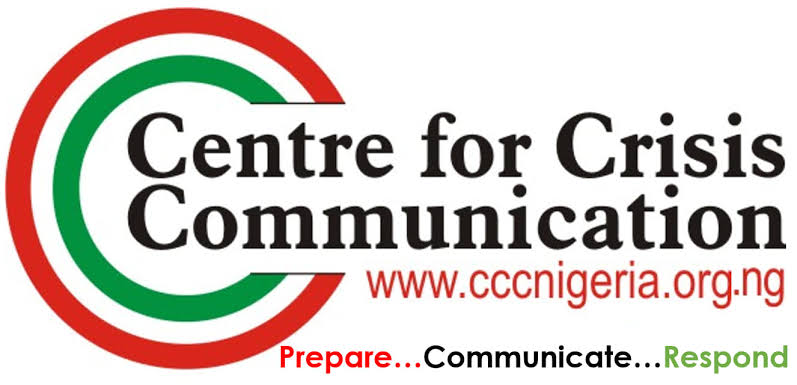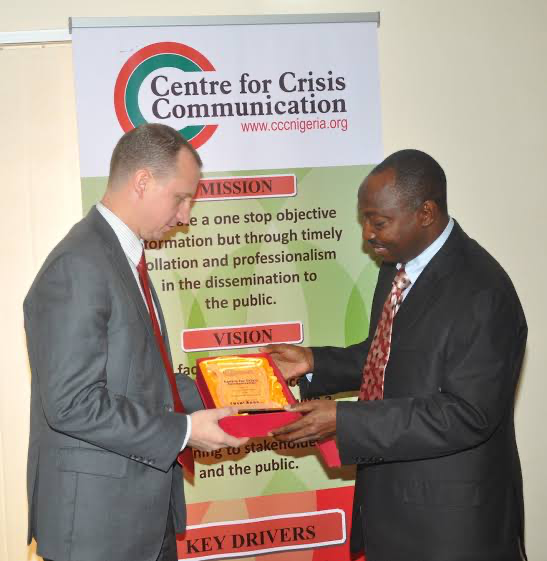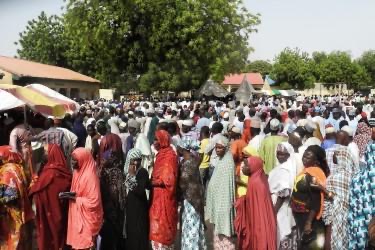Gentlemen of the press, you are welcome to another edition of our periodic media briefing on crisis situations in the country.
In line with our mandate, the Centre for Crisis Communication remains committed to constantly monitor and evaluate the dynamics in our society with a view to identifying issues that possibly breed conflict or escalate into crisis and sensitise the polity. The following are issues of concern to the Centre and we have been closely following the developments:
THE MASSOB, IPOB AND BZM BIAFRA SECESSIONIST CAULDRON
For the past several weeks, the nation has been inundated by threats of secession by a few groups in parts of Nigeria. The Centre views this secessionist cauldron as not only grossly uncharitable to the entire nation but unwarranted coming at a time the country is not only consolidating its nascent democracy but also celebrated a centenary of its amalgamation and fifty-first independence anniversary. These unfortunate secessionist agitations are also coming on the heels of the widely acclaimed free and fair elections that brought about a new government in Nigeria.
The recent disruptive protests in some South East and South- South cities orchestrated by secessionist ideologues by the Movement for the Actualisation of the Sovereign State of Biafra (MASSOB), the Indigenous Peoples of Biafra (IPOB) and the Biafra Zionist Movement (BZM) agitating for the sovereign state of Biafra stands not only diversionary but also condemnable. The Centre strongly believes that the issue of the State of Biafra was historically rested in 1970 following the end of the civil war. Therefore, secession should not be an option for any individual or group in Nigeria especially after the 30 months war that killed, maimed millions of lives and destroyed unquantifiable property and infrastructure. Unguarded statements and violent demonstrations are therefore unhelpful and capable of escalating unnecessary crisis.
Listen to this brief video clip of Nnamdi Kanu, the Director of Radio Biafra and his message. The CCC has monitored the activities of Radio Biafra. It is the Centre’s conclusion that several contents broadcasted were seditious and even bordering on treason against the Nigerian state. This is akin to similar hate messages by a radio station during the Rwandan genocide against sections of the country and the government. Indeed, at an earlier media briefing in August, the Centre highlighted the menacing broadcast of the pirate Radio Biafra which no doubt could be described as being on a mission to orchestrate disunity in Nigeria.
Accordingly, the Centre calls on MASSOB and IPOB to seek legitimate avenues of channeling their grievances or injustices on any perceived socio-economic and political issues in their region within the current democratic space. The Centre notes the spirited efforts of the governors of the South East and other leaders in the region to broker peace. This is commendable because true leaders in any society always wade quickly into crisis before it gets out of hand. The Centre also wants to encourage the Federal Government to promptly engage the MASSOB, IPOB and indeed any other group in a meaningful dialogue within the laws of Nigeria with a view to resolving current or emerging crisis. This is no time to stroke new crisis in the country, but rather a period to cement “the indivisibility and perpetuity of the Nigerian federation”, in the words of the great Dr Nnamdi Azikiwe. Indeed, several years after the Nigerian Civil war; this is a video clip of Chief Odumegbu Ojukwu of the blessed memory when he spoke against another attempt at war with intent to actualise the state of Biafra.
The Centre equally recalls the alleged threats by a section of Yoruba elders to secede on the basis of issues of insecurity occasioned by remote causes of the skirmishes between Fulani cattle herdsmen and farmers in the South West and the recent criminal abduction of Chief Olu Falae. The Centre for Crisis Communication had at its previous media briefings on 4th August and 1st October 2015 raised concern about the spate of kidnappings and armed banditry across the nation and specifically described the kidnap of Chief Falae as totally condemnable. The Centre called on the security agencies to rise up to the challenge while decrying the unguarded statements credited to some prominent Yoruba leaders then and the consequences of such statements on the polity.
Let us all remember that our present political dynamics as a country lend credence to the sacrifices of our founding fathers so that we all can have a focused and dynamic nation.
FIGHT AGAINST INSURGENCY AND THE NEED TO LOOK BEYOND THE DECEMBER 2015 DEADLINE
As the military continues to considerably route and degrade the capability of the Boko Haram insurgents and render them incapable of further occupying territories or engaging the military in a straight fight, it is perhaps not out of place to have another look at the current December 2015 deadline to end the terrorism of Boko Haram. The time line on when to stop the insurgents from activating sleeper cells and detonating bombs on soft targets in any part of the country, especially in the frontline states, should therefore not be sacrosanct.
The Centre believes that while it might not be wrong to set targets for military operations as was done by President MUhammadu Buhari when he tasked the military to wrap up the fight against Boko Haram by December 2015, it must also be stated that this target date might be unrealistic. This submission is predicated on the fact that asymmetric warfare which the Boko Haram is prosecuting against Nigeria is not such that can be completely stamped out by the military within a three month period. This is against the backdrop of the fact that the insurgency has been going on for over six years and a three times state of emergency in the North East. The issue the Centre is trying to raise is that the military should not be vilified in the event that at the end of December we still experience pockets of terrorist acts in some parts of the country.
Laudable as the current concerted efforts of the military has been on the fight against terrorism, the just concluded United Nations General Assembly agreed “that terrorism as an ideology is largely emotive because it has to do with the mind. Force has never been known to combat, in a precise manner, any issue that has to do with the mind.” What the UN is inferring here is that other methods or approaches to ending terrorism and putting them out of relevance need to be explored alongside the military campaign. These include addressing such issues as youth unemployment, education opportunities and infrastructural development among others.
Nigerians should continue to cooperate with the government and support the security forces to ensure that the enemies do not continue to have an opportunity to unleash terror in our country. The media has a big role to play in this respect.
KUDOS FOR WINNING THE BATTLE AGAINST WILD POLIO
A few weeks ago, the World Health Organisation (WHO) removed Nigeria from the list of polio-endemic countries. As a matter of fact, in the last 15 months there has not been any reported case of polio. This is obviously a landmark achievement considering that in 2012, the number of polio cases in Nigeria was more than half the world’s total. President Muhammadu Buhari has assured the WHO that polio will be completely eradicated by 2017.
Whilst we await that final outcome, we must thank those who worked actively in the last two decades to achieve this success. We must especially thank the men and women and boys and girls, who do not make the headlines but who are actually the true heroes who risked death and those who died going to the remotest parts of this country to ensure that Nigerian children do not suffer a lifetime of incapacitation, anguish and neglect. Congratulations to them and to everyone who contributed in one way or the other to ensure this heartwarming success over polio.
INAPPROPRIATE NIGERIAN MUSIC VIDEOS AND LYRICS AS A PRECURSOR TO INCREASED CRIME IN THE SOCIETY
The Centre is increasingly worried about the lewd content of the music video being churned out by some Nigerian artists and producers in recent times. Music videos are supposed to be a medium for artistes to showcase their looks, dance steps and convey a message through their songs as well as tell a story. However, in the current Nigerian music landscape, it has grown beyond these noble objectives into a medium for the display of gangsterism, drug abuse, sex and violence. Many of our videos have become bad deal for our impressionable youths who tend to copy most of what they see.
The Centre is of the view that these days, caution has been thrown into the winds by our cinematographers and producers; the new form of entertainment from most of them is the wanton display of nudity, sexually expressive scenes, vulgar lyrics, glorification of drugs and other forms of obscenities that are grossly offensive and inimical to our cherished values. Our studies have shown a correlation between bad music videos and violent crimes such as rape, armed robbery, drug use and peddling among our adolescents and youths.
The Centre therefore urge relevant agencies of government to as a matter of urgency regularly evaluate the contents of our local and pirated videos before irreparable damage is done on the psyche of our leaders of tomorrow by this burgeoning antisocial activity.
POST IDPS MANAGEMENT PROGRAMME
The Centre is not only concerned about the present condition of the internally displaced persons in the camps but also worried about their post-camp fate. Having undertaken an assessment visit to some of the camps in Maiduguri, the Centre has a firsthand understanding of the situation in the camps and the dire consequences of not putting adequate structure on ground to carter for them.
The Centre is strongly suggesting the establishment of a lead government agency that will develop a Marshall plan for the rehabilitation of all the displaced people in the North East. This could also be in the form of Inter- Ministerial Plan with an administrative office with a similar scope as the Presidential Amnesty Programme for the Niger Delta Youths. This will oversee the data capturing, profiling and rehabilitation of all the displaced people in the frontline states and other affected states of Nigeria. The plan will identify the priority areas of needs, skills and challenges with a view to settling them productively to avoid recourse to crimes or antisocial behavior.
Once again, I thank you all for coming.
Air Commodore Yusuf Anas (Rtd)
Executive Secretary.




